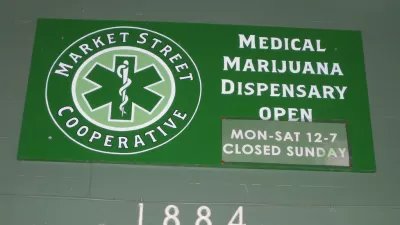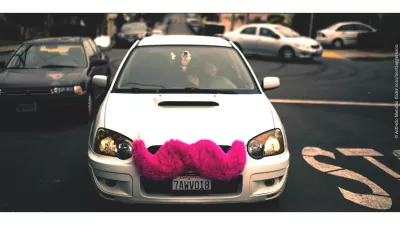Regulation
Mayor de Blasio Op-Ed Supports New Regulations for Uber
An op-ed by Mayor Bill de Blasio declares that the time has come to regulate transportation companies like Uber.

Op-Ed: Regulation Has Urban Progressives Confused
According to Aaron M. Renn, left-leaning urbanists chafe against a regulatory culture their ideology supports. Favoring "regulation for thee but not for me," they want to bend the rules, but only for enterprises they like.

Transportation Start-up Fails for Being Too Public-Minded
Night School, planning to use school bus fleets to supplement late-night Bay Area transit, lost the regulatory fights Uber and Lyft handily won.
In Defense of Uncertainty in the Development Approval Process
While streamlining and anti-NIMBYism are in vogue, Murtaza Baxamusa reminds us what's really at stake.
First State Legislature to Regulate Uber and Lyft: Colorado
Ivan Moreno reports for the Associated Press on the Colorado Legislature's approval of a bill to regulate transportation network companies like Uber, Lyft, and Sidecar.

Veto Kills Uber and Lyft Regulation Exemptions in Arizona
While many states are rushing to figure out how to regulate transportation network companies like Uber, Lyft, and Sidecar, Arizona came very close to exempting the companies from the taxi and limo regulations.
A Shot Across the Bow of the Shared Economy
New York Attorney General Eric T. Schneiderman penned an op-ed for the New York Times that specifically calls out Airbnb and Uber—two companies at the forefront of calls to regulate the emerging sharing economy.
Seattle’s Cap on Uber, Lyft, and Sidecar Rescinded by Referendum
After Seattle Citizens to Repeal Ordinance 124441 acquired twice the necessary number of signatures necessary to send a March ordinance capping the number of Uber, Lyft, and Sidecar drivers in the city, the mayor will negotiate with the companies.
More on the High Cost of Infrastructure
A recent editorial in Atlantic Cities laments the regulations and policies that have, according to the author, driven up the costs of infrastructure investments in the United States.
How Cities Prohibit Annoyances
The 5,000 local ordinances that prohibit “annoyances” often focus on the fraught intersections of the public and private. And it’s probably no surprise that public employees often seek legal protections from annoying (or annoyed) citizens.
Seattle Caps Number of Uber, Lyft, and Sidecar Drivers
Seattle is the first city in the country to limit the number of transportation network drivers allowed on the road at any given moment. The new regulation is a setback for companies like Uber, Lyft, and Sidecar and a major victory for cab companies.
A Call to Regulators: Do More to Protect Electricity Infrastructure
America’s electricity infrastructure is vulnerable to physical attack. And while federal regulators have known this for years, they’ve been slow to compel security upgrades.
Taxis v. Uber: A Regulatory Update
Are rideshare companies like Uber here to stay? The answer likely hinges on a series of legal battles taking place nationwide.
Making the Case for Speeding
Not everyone likes the idea of slowing down, but sometimes advocacy for increased speed limits can come from surprising sources, like the editorial director of a UK journal for architects.
How the Best Laid Smart Growth Plans go to Waste
Since the 1990s, Maryland has been at the forefront of Smart Growth planning at the statewide level. However, a new study shows that the state's incentive-based approach may not be adequate for inducing the changes envisioned by planners.
The Headwinds Hindering America’s Transition to Renewable Energy
Nations like Denmark are leading the world in producing renewable energy. But the transition to renewables doesn’t just amount to the number of solar panels or wind turbines that can be built, it takes a smart grid to maximize their potential.
Making Regulatory Reform Work in Seattle
Although Seattle's downtown redevelopment may be receiving plaudits, Chuck Wolfe describes efforts underway to rethink land use regulations on a broader level in the city, with jobs in mind.
Even or Odd? Rome Restricts Car Use
With pollution levels becoming dangerous in Rome, Italy, the government is taking a hard line on driving. In late November, only cars with even-numbered license plates were allowed to drive in the city, with odd plates the next.
Turning Yellow Cabs Green
Cities in the C40 climate leadership group from across the globe are looking into improving taxi services, citing them as key to mobility in urban centers.
Pagination
Urban Design for Planners 1: Software Tools
This six-course series explores essential urban design concepts using open source software and equips planners with the tools they need to participate fully in the urban design process.
Planning for Universal Design
Learn the tools for implementing Universal Design in planning regulations.
Caltrans
Smith Gee Studio
Institute for Housing and Urban Development Studies (IHS)
City of Grandview
Harvard GSD Executive Education
Toledo-Lucas County Plan Commissions
Salt Lake City
NYU Wagner Graduate School of Public Service


































